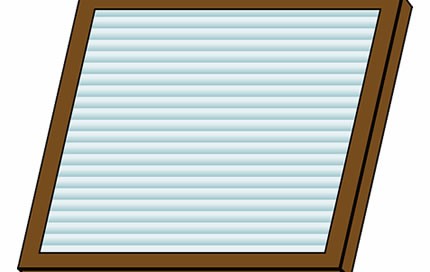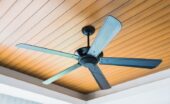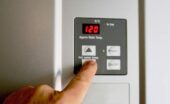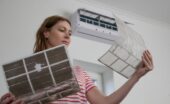4 Reasons to Replace a Home Air Filter
Written by SayBuild Administration // April 20, 2014 // Home Heating Cooling // Comments Off on 4 Reasons to Replace a Home Air Filter

The proper maintenance of a home’s heating, ventilation and air conditioning (HVAC) system is crucial to ensure its efficiency and longevity. Regular system maintenance keeps everyone in the home safe from extreme temperatures and poor air quality. It also saves money for the homeowner.
The HVAC system heats a home during the cold, blustery months of winter. It also keeps the home cool during hot and humid summers. To ensure that the system works properly, a homeowner must change the filter on a regular basis.
A home air filter keeps the HVAC system in good working order by filtering out debris and pollution. A dirty filter slows the air flow, making the furnace or air conditioner work harder to heat or cool the home. Not only does this waste energy, but it also creates higher energy bills. Here are four more reasons to change the air filter regularly.
1. Prevent System Failure —
A dirty air filter is the top cause of HVAC system failure. It restricts air flow from the system’s air handler. This places additional strain on the fan motor. Over time, it can burn out the motor and cause the system to overheat.
2. Improve Air Quality —
A dirty filter reduces a home’s air quality. This can aggravate asthma and allergies, especially children’s allergies. Changing the air filter can improve a family’s health.
3. Eliminate Dirty Ducts —
A dirty air filter makes the HVAC system, ducts and vents get dirty faster. Cleaning the ductwork can get costly, and a homeowner may need to replace the heating unit or air conditioner sooner than expected.
4. Reduce the Carbon Footprint —
A dirty filter increases a home’s carbon footprint. Regular filter replacement reduces the amount of energy consumed in the home. It is also an easy, inexpensive way to protect the environment.
In most homes, the air filter is located near the air handler for the furnace or air conditioner. This large box contains the fan and fan motor. The air handler pulls air into the system through return ducts and then blows it out through the heating and cooling systems. The air returns back into the house through the ducts.
According to Energy Star, a voluntary program of the United States Environmental Protection Agency (EPA), home air filters should be changed either monthly or quarterly depending on the type. For the suggested replacement frequency, homeowners can check the product information on a filter. During times of the year when the HVAC system is running more often, air filters may require more frequent changing.
The purchase of air filters is a necessary expense that is part of home ownership. However, filter replacement is a small investment to extend the life of an HVAC system. It also saves money in the long run because it prevents damage to the system and costly repairs. Moreover, replacing the filter keeps everyone in the home safer and healthier.








 If you want to contribute tutorials, news or other money-related stuff:
If you want to contribute tutorials, news or other money-related stuff:  Share our home building library with your facebook friends:
Share our home building library with your facebook friends:  Do you have any ideas or suggestions you would like to make?
Do you have any ideas or suggestions you would like to make?  If you like what we do, please subscribe to our
If you like what we do, please subscribe to our  All content Copyright © 2012 SayBuild. Part of nBuy Home Management Network.
All content Copyright © 2012 SayBuild. Part of nBuy Home Management Network.